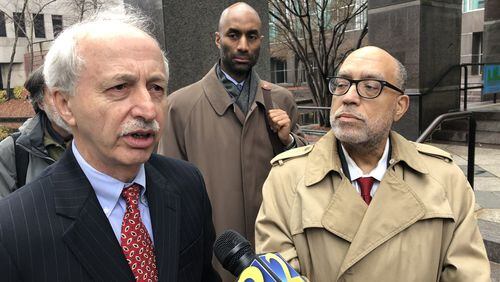A Fulton County judge has given the city of Atlanta and opponents of the massive Gulch project until next week to ready their arguments for why public bonds should or should not be issued to help fund the $5 billion development.
Fulton County Superior Court Chief Judge Robert McBurney on Monday continued a hearing to “validate” bonds for the sprawling 40-acre site until Dec. 19.
VIDEO: More on the Gulch
Under Georgia law, a validation hearing is required before a governmental entity can issue bonds. It’s typically a routine matter in which a judge assures investors who would purchase the bonds that the debt issued by the government agency is legal and binding.
But that routine step has become another potential battleground for Gulch opponents who allege in a court filing that the up to $1.9 billion public financing package is potentially illegal.
Four members of the Redlight the Gulch Coalition, including former state Sen. Vincent Fort, have filed more than two dozen objections to the deal.
MORE ON PROPOSED GULCH REDEVELOPMENT
Among their contentions is that 15 years of future school taxes have been improperly added to the financing package without necessary approvals of the Atlanta Public School board. They also argue that the Fulton County Commission must vote to approve the county’s participation in the project.
Meanwhile, an APS employee whose child is a student in the district also is contesting the bond validation proceedings.
Attorneys for the employee, Erica Long, did not disclose her objections and declined comment Monday. They told McBurney that they expect to file their arguments by Friday afternoon.
Attorneys for the city and Gulch developer CIM Group declined comment after the hearing.
In a statement, APS spokesman Ian Smith said the continuance “gives APS time to continue our discussions with the city.”
While he wouldn’t comment further on those discussions, he said the district maintains “ reasonable hope for a resolution.”
In November, Atlanta City Council approved the complex public financing package that would allow CIM to tap into future sales taxes and property taxes created within the Gulch development to help fund its construction.
Under the deal, CIM could collect five cents of the local 8.9-cent sales tax generated within the project’s footprint through 2048 to pay for costly infrastructure.
The second public funding stream would come from future property taxes created by the development within a zone known as the Westside Tax Allocation District or TAD.
TADs are areas where property tax collections for cities, counties and schools are frozen for a period of time. Future increases in tax collections from rising property values as the area redevelops are used to help pay for development.
In theory, after the TAD expires, the participating government bodies — such as school systems — reap the financial benefit of new, higher property values.
The city, Fulton and APS are all parties to the Westside TAD and have agreed to forgo future property taxes to help spur development in neighborhoods west of downtown.
The city has said that the three government entities have committed their property tax “increment,” or the amount above what’s been frozen, through 2038.
But in a filing, Carranza Pryor, an attorney for the Redlight the Gulch Coalition, said the school system’s agreement to a Westside redevelopment plan called for the TAD to terminate at the end of 2023. APS, unlike the city and Fulton, never voted to extend the schools’ participation to 2038, a court filing states.
Julian Bene, a leader of Redlight the Gulch, called the Gulch deal “a fraud.”
“The entire Gulch TAD is invalid because it relied on 15 years of school tax increment that they’re not entitled to,” Bene said after the hearing. “But if we had not intervened today, then the city would have walked away with 15 years’ worth, about $310 million worth of school tax money.”
Fulton, meanwhile, when it agreed to the 2038 extension required that the commission must approve the use of its tax dollars for any development commenced after Dec. 31 of this year, Bene said. That vote hasn’t happened.
A Fulton spokeswoman said Chairman Robb Pitts does not think the county needs to approve its participation in the Gulch deal, but county officials were still working to confirm that interpretation.
Smith, the APS spokesman, said he “cannot speak to the accuracy of other parties’ challenges as it relates to this matter,” and said the Redlight the Gulch Coalition does not speak for APS.
The school board last week passed a resolution by a 7-2 vote requiring the board's written approval before school taxes within the Westside TAD could be used for new development. That move triggered a furious response from Mayor Keisha Lance Bottoms, whose office called the resolution "misguided and potentially unlawful."
In a more measured statement Monday, Bottoms’ office declined to comment on the arguments made by Gulch opponents.
“However, we remain confident that the financing plan complies with state law and we intend to use the period between hearings as an opportunity to continue discussions with our partners at Atlanta Public Schools,” Bottoms’ spokesman Michael Smith said.
Staff writers Vanessa McCray and Arielle Kass contributed to this report.
The story so far
On Nov. 5, the Atlanta City Council approved an up to $1.9 billion public financing package for downtown’s $5 billion Gulch redevelopment project. Since that time, Atlanta Public Schools has pushed back against the use of future school taxes collected within a special taxing district known as the Westside TAD. Last week, the school board passed a resolution requiring board approval before school taxes are used for redevelopment on the Westside. On Monday, a judge continued a crucial bond hearing until Dec. 19 as the city and opponents prepare their arguments.










